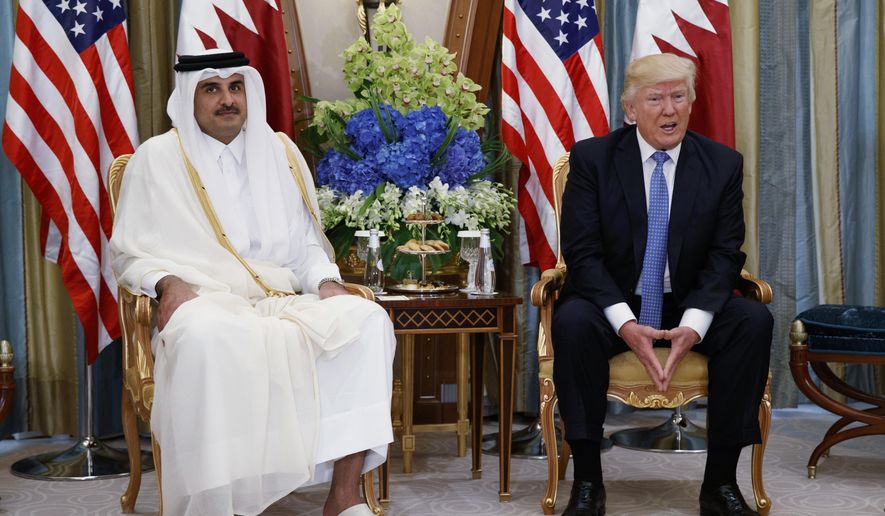President Trump spoke by phone Wednesday with the leader of Qatar, offering to help resolve a bitter diplomatic crisis between that country and other U.S. Arab allies that threatens the fight to block terror financing, take on groups such as Hamas and the Muslim Brotherhood and contain Iran’s ambitions in the region.
The White House said Mr. Trump “offered to help the parties resolve their differences, including through a meeting at the White House if necessary.”
Led by Saudi Arabia and Egypt, nine nations have so far moved to sever diplomatic ties with Qatar, a small nation of about 2.3 million on the Persian Gulf, but one which ranks among the globe’s energy superpowers and which is also the home to a U.S. military base critical to the wars in Iraq and Syria. Saudi Arabia has cut all land, sea and air travel with Qatar, while the United Arab Emirates has closed airports and harbors to Qatari flights and shipping.
In the phone call, Mr. Trump reminded Emir Sheikh Tameem Bin Hamad Al Thani of Qatar of “the importance of all countries in the region working together to prevent the financing of terrorist organizations and stop the promotion of extremist ideology,” the White House said in a statement. Mr. Trump also spoke by phone with Crown Prince Mohamed Bin Zayed Al Nahyan of the United Arab Emirates during the day, the White House revealed.
Mr. Trump’s moves were backed by House Speaker Paul D. Ryan, who acknowledged the U.S. had to balance its support for its Gulf allies like Saudi Arabia with its need for the base in Qatar.
“I do think that we should put some pressure on Qatar” because “I think they can improve their foreign policy — let’s just put it that way,” Mr. Ryan told reporters in Washington.
SEE ALSO: UAE says it will punish anyone who speaks out in defense of Qatar
The diplomatic row took place just two weeks after Mr. Trump convened a meeting of Arab and Muslim leaders in Saudi Arabia, securing promises from more than 50 nations — including Qatar — to step up efforts to combat terrorism. In postings to Twitter, Mr. Trump originally seemed to suggest the ostracism of Kuwait was a direct product of his own efforts to rally the Muslim world against Islamist radicals.
But the rift could complicate U.S. efforts in the region, with Qatar potentially turning to Turkey and Iran and putting a cloud over the use of the Al Udeid air base.
“Strong support by the United States for the Saudi-led coalition likely bolstered those countries’ confidence in making the move to isolate Doha to this degree,” the private intelligence firm Stratfor wrote in an analysis Wednesday. “However, that rift also complicates the United States’ mission, since it counts on a tight Sunni coalition to manage regional threats like the Islamic State.”
Despite Mr. Trump’s offer and mediation offers from regional states such as Kuwait, there were few signs the anger in the region was easing.
A top Emirati diplomat told The Associated Press Wednesday “there’s nothing to negotiate” with Qatar over its alleged funding of terror groups, signaling Arab countries won’t back down.
Speaking in a rare interview, Emirati Minister of State for Foreign Affairs Anwar Gargash told the wire service that Qatar has “chosen to ride the tiger of extremism and terrorism” and now needed to pay the price.
Mr. Gargash said Qatar “absolutely” should expel members of Hamas, stop its support of terror groups “with al Qaeda DNA” around the world and rein in the many media outlets it funds, chief among them the Doha-based satellite news network Al-Jazeera, whose reporting has repeatedly embarrassed top officials in Saudi Arabia, Egypt and other states in the region.
In one sign of hardening stances, the UAE is threatening stiff fines and up to 15 years in prison for anyone who expresses any other kind of public support for Qatar.
“Strict and firm action will be taken against anyone who shows sympathy or any form of bias towards Qatar, or against anyone who objects to the position of the United Arab Emirates,” UAE Attorney General Hamad Saif Al Shamsi said in a statement to Arabic media.
On a visit to Germany, Saudi Arabia’s foreign minister told reporters it was with “great pain” that his country and others moved against Qatar, while arguing the “crisis” with the small Gulf nation is based on years of frustration with Doha’s policies.
Adel al-Jubeir said he hopes Qatar can respond to demands put forward by his country, Bahrain, the United Arab Emirates and Egypt to “restore relations to how they were in the past.”
There was an “understanding” that Qatar would “take measures in relation to supporting some organizations and … some individuals,” Mr. al-Jubeir said, but Qatar didn’t live up to its commitments.
⦁ This article was based in part on wire service reports.
• Dave Boyer can be reached at dboyer@washingtontimes.com.
• Guy Taylor can be reached at gtaylor@washingtontimes.com.




Please read our comment policy before commenting.